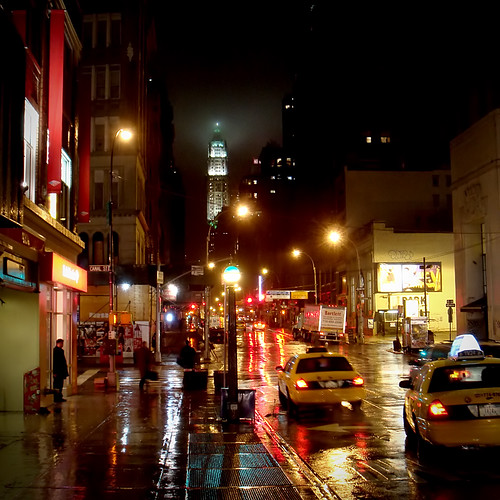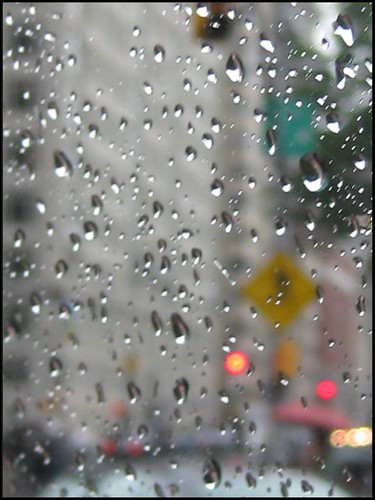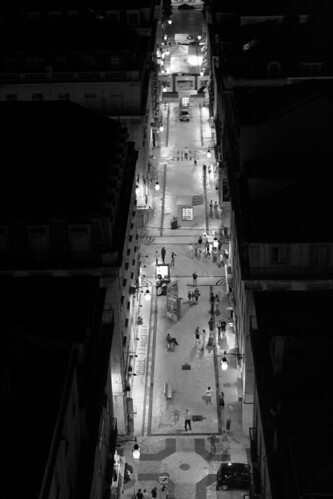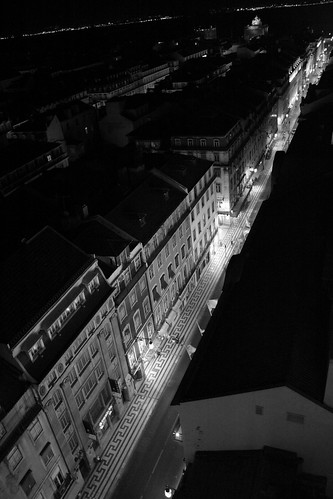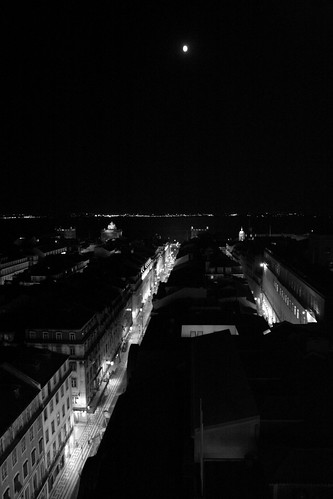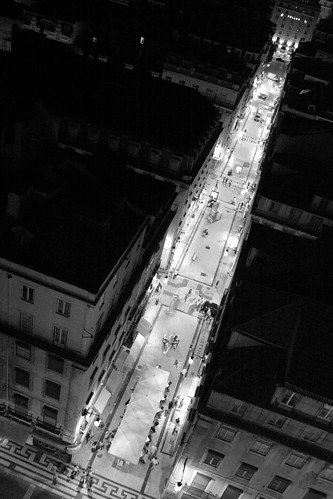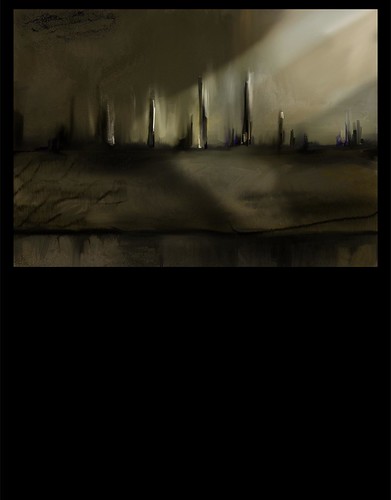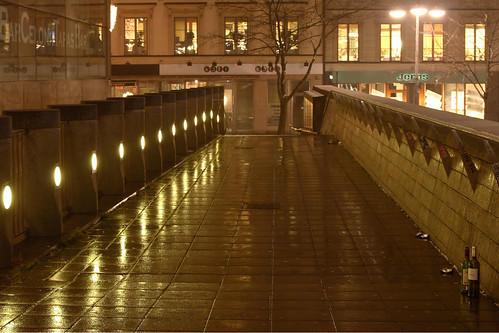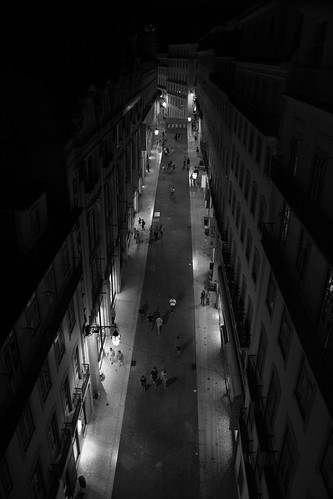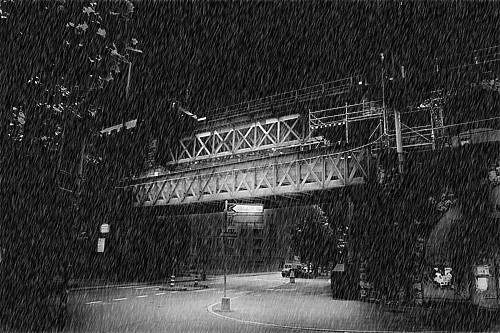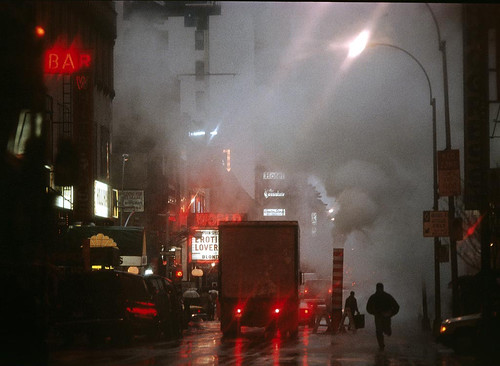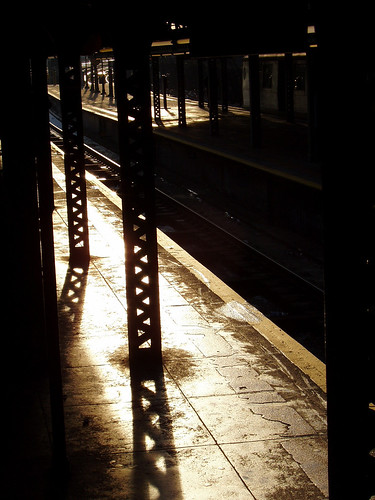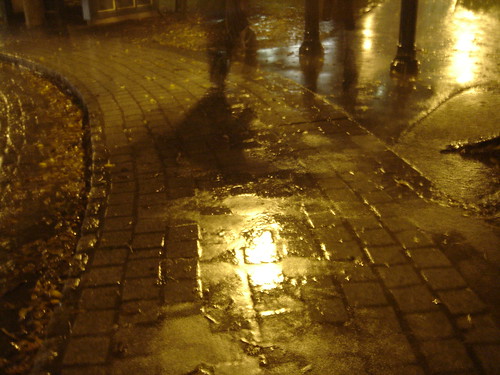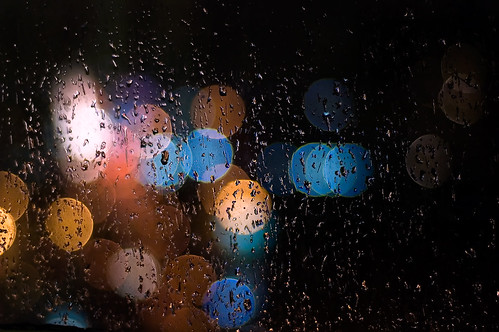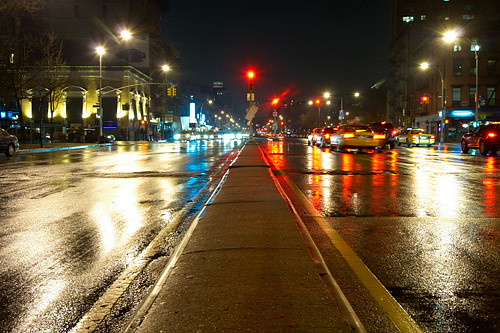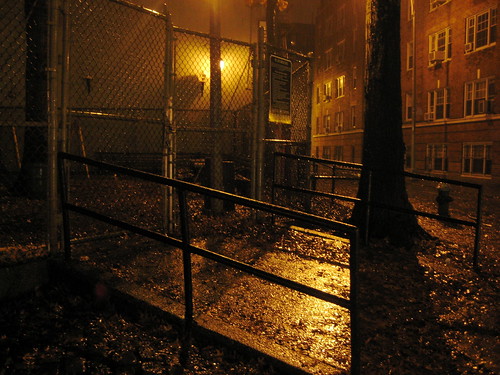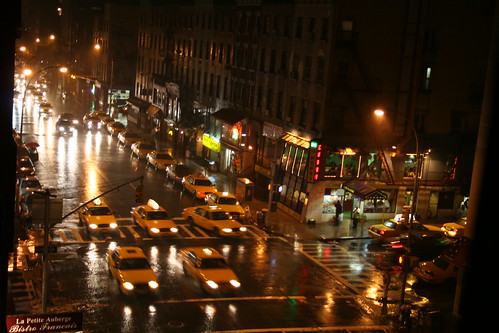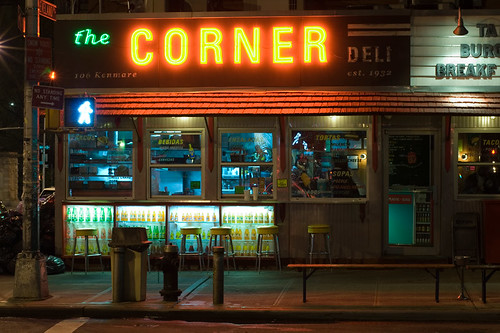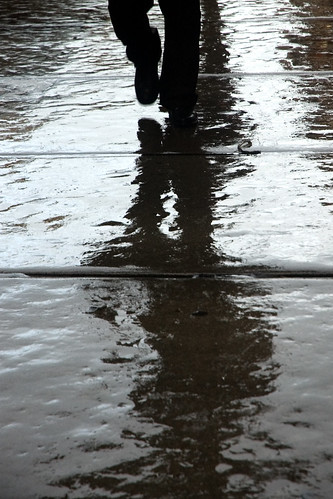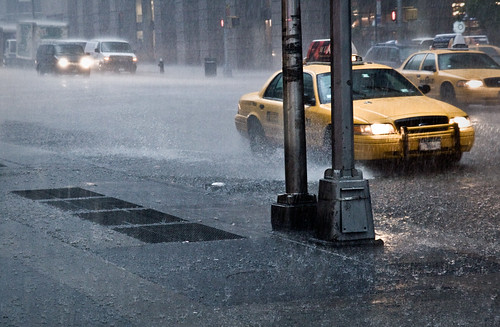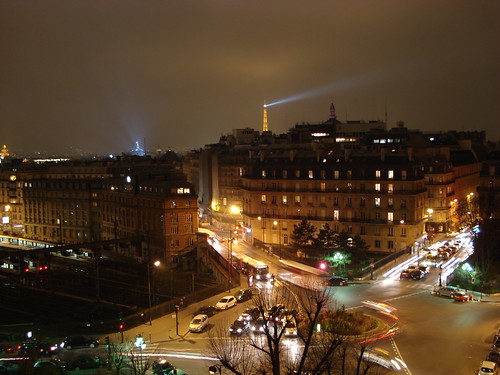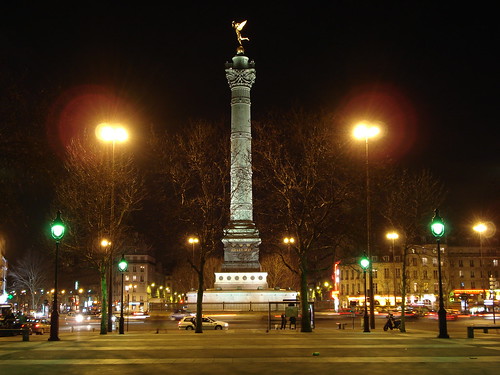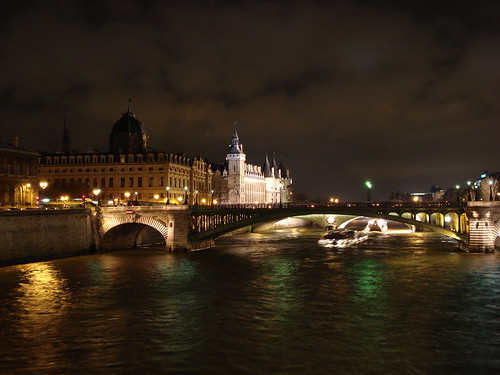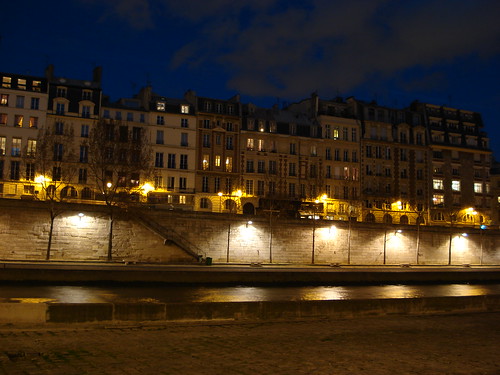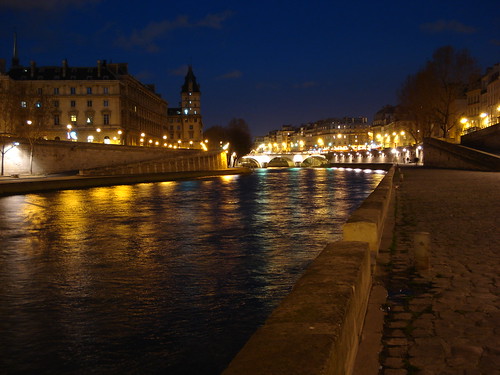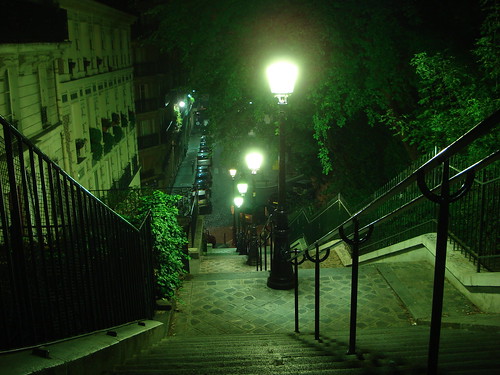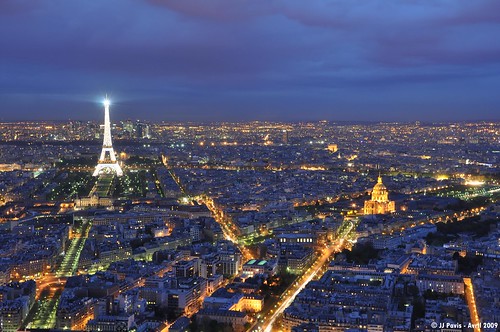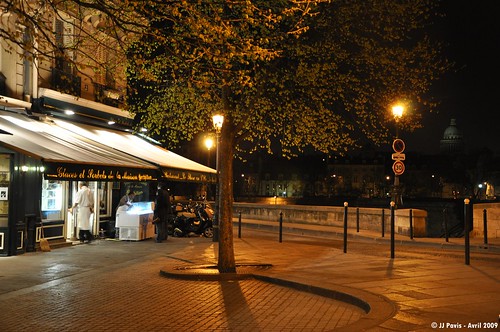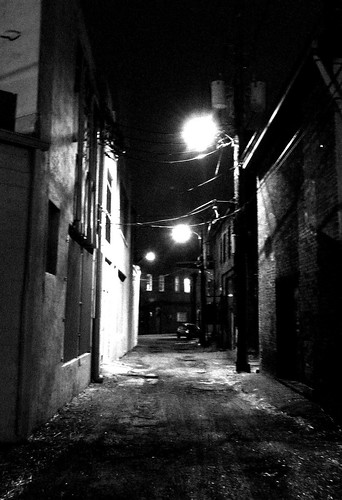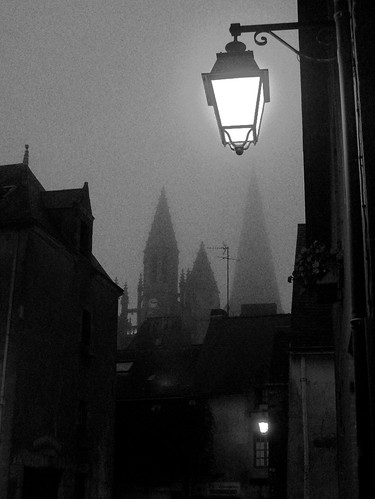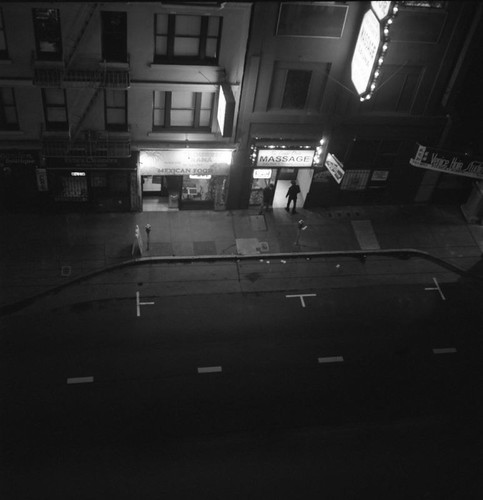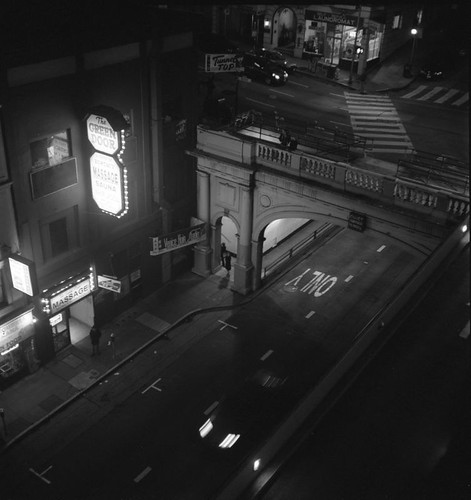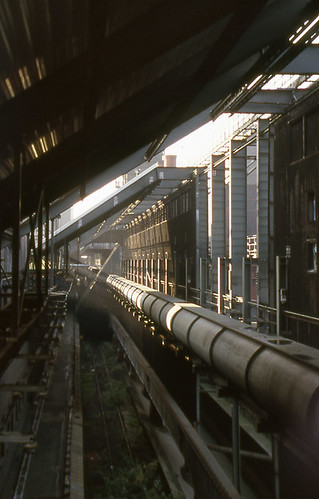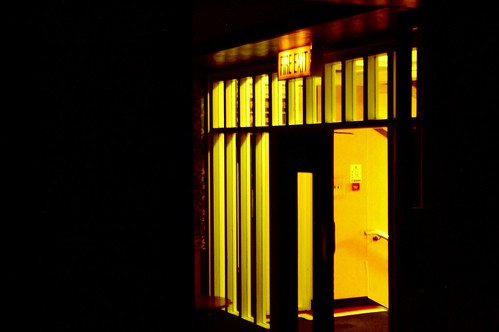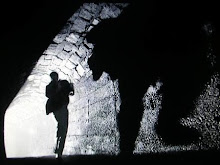"I was only trying to surmount for a little while the darkness that all my life I surely knew was going to come rolling in on me one day and obliterate me. I was only trying to stay alive a little brief while longer, after I was already gone.’”
Cornell Woolrich
Blues Of A Lifetime
OZYMANDIAS
I met a traveller from an antique land
Who said: Two vast and trunkless legs of stone
Stand in the desert. Near them on the sand,
Half sunk, a shatter'd visage lies, whose frown
And wrinkled lip and sneer of cold command
Tell that its sculptor well those passions read
Which yet survive, stamp'd on these lifeless things,
The hand that mock'd them and the heart that fed.
And on the pedestal these words appear:
"My name is Ozymandias, king of kings:
Look on my works, ye Mighty, and despair!"
Nothing beside remains: round the decay
Of that colossal wreck, boundless and bare,
The lone and level sands stretch far away
Percy Bysshe Shelley
Wednesday, April 29, 2009
Tuesday, April 28, 2009
The Invention of Solitude

Paul Auster's Urban Nothingness
This article first appeared as "Paul Auster. L'inessenza urbana" in the Italian review of social studies Alfa Zeta, issue 54, april 1996, pp. 18-23. I am grateful to Andrea Borsari for his help and support.
In The Invention of Solitude (Paul Auster's first book), the autobiographical character A. offers a prayer to the "modern nothingness." The expression alludes to Auster's view of reality, a reality that melts more and more as our look gets close to it. The core idea of modern nothingness is that the more difficult our rational effort to understand an event gets, the more our reference categories crumble in our hands. Auster uses this idea in many of his novels, and in The Red Notebook described it as a situation in which "two truths ... lived both in equal measure ... cancelled each other out," until you get "strained in the middle" (RN, 27). A metaphor seems to harbour in the modern nothingness: the non-contradiction principle (by which carrying out a possibility excludes its opposite) simply doesn't work anymore.
A similar concept was explored by sociologist Marshall Berman in the essay "The Experience of Modernity: All That Is Solid Melts Into Air." Berman acquires the oxymoronic metaphor in his title from The Manifest of the Communist Party by Marx and Engels, who describe modernity as the situation in which "everything includes the germ of its contrary." Auster and Berman (both living in New York) take note of city's modern nothingness: a city grown so exceedingly large that it has finally lost its reference parameters. In the two American writers, the city becomes the embodiment of the paradigm of modernity, having become, in Berman's words, "a multimedia representation whose auditorium is the whole world" (1).
These words refer to New York, the town where many Auster's novels take place. "New York was an inexhaustible space, a labyrinth of endless steps and no matter far he walked ..., it always left him with the feeling of being lost. Lost, not only in the city, but within himself as well" (NYT, 4). But even when not the main focus, New York's nothingness flows undisputed through Auster's narratives. In City of Glass, the New York Trilogy's first novel, the metropolis' glassy transparency recalled in the title becomes absolute: the place above all, the sparkling destination in the travel agency books, has become an extract of pure absence. Point of view vanishes, felled for the metropolis' marvels; everything blends together in a whirl of constant movement.
He felt as though he were leaving himself behind, and by giving himself up to the movement of the streets, by reducing himself to a seeing eye, he was able to escape the obligation to think.... The world was outside of him, around him, before him, and the speed with which it kept changing made it impossible for him to dwell on any one thing for very long. Motion was of the essence. (id.)
Walter Benjamin, in the essay about Paris ("Capital of Nineteenth Century") wrote of a "phantasmagoria" as one of the main features of nineteenth century metropolitan modernism. In Benjamin's view, the development of the metropolis during the last century has established a series of images in the collective unconscious, "images in which the new penetrates into the old, forming utopia." The modern utopia develops not only from ideology but—a fortiori—from an urban source where middle class finds out its apotheosis and failure at the same time. So the metropolis becomes the paradigm of dreams and ideals destroyed, "even before the falling of their symbolic buildings," and of a form of nomadic individualism that has its models in Baudelaire's intérieur and Poe's "Man of the Crowd": "the crowd," to quote Benjamin again, "is the veil through which the well known city appears to the flaneur as phantasmagoria" (2). But the man of the crowd is also Auster's man, whose steps "brought him elsewhere than into himself" (The Invention of Solitude). City's phantasmagoria has turned into its contrary, a hallucinated vision where the overwhelming presence of everthing has finally transformed into pure nothingness: in City of Glass, New York is described as the "nowhere" Quinn has built around himself. The essence of the city—the continuing streets flowing around an entirely empty individual—is the modern nothingness.
New York's paradigm is even more useful if we think about the English verb to melt, whose meanings vary from Berman's "dissolve" to "vanish," "disperse," and "blend." And when we think of a place where things blend or melt, we obviously think of multicultural New York. This melting pot is the cultural, ethnic and race mixing which represents the basis of American foundation: an utopian plan that, just like Benjamin's bourgeois dream, has melted into air with the echoes of rival gangs' shootings. In the 1970's Marshall Berman claimed a sort of hope in realising his modernist utopia, in a "celebration of urban life's liveliness, variety and height." But the melting pot utopia has slowly revealed its inner ambiguity: if the plan was to blend the different cultures in a general "national identity," we surely cannot say that today's United States, with its society increasingly splintered across ethnic, economic and regional lines, adheres to this ideal.
Someone else opposes the myth of the "Great American Drawing," explained as a fusion of heterogeneous cultures into one identity (or, at the opposite side, lived as an extreme separatism phenomena among the ethnic groups). Mario Maffi, an italian scholar who has lived for many years in the Lower East Side (an immigrants' goal until the end of last century), applies to the quarter the idea of a "socio-cultural hybridisation" and explains the Lower East Side as a positive model for the development of the entire country, "a sort of wide metaphor of America itself—a metaphor of the way it has grown up and changed, and goes on growing and changing, and of the way immigrant cultures from all over the world contributed to this dialectic process" (3). This is no longer a one-way melting pot. It is a sort of osmotic relation expressing itself in a multiform strain among some forms of life that, in addition to molding themselves into a new communitarian dimension, mold America at the same time.
Auster's situation doesn't look much different. Auster lives and works in Park Slope, a sort of interethnic oasis, a hanging limbo in the middle of New York racial conflicts. In an interview about Smoke and Blue in the Face, Auster described Park Slope as "one of the most democratic and tolerant places on earth." Auster has painted his world in the two recent movies co-authored with Wayne Wang. In Smoke we see a series of human ups and downs, all related to Auggey Wren's tobacco shop in Brooklyn. This is a place where the lost urban mankind often depicted in dark colors in Auster's novels meet (but in Auster's words Smoke is "the most optimistic thing I've ever written"). In the same way, Blue in the Face is an "hymn to the Great Popular Brooklyn Republic" where, as a movie's walk-on remembers, "there are 90 different ethnic groups, 32000 commercial shops and 1500 churches, synagogues and mosques." In one sense, Smoke is an attempt to escape urban nothingness. Auggey Wren's daily snapshots on the same subject (the tobacco shop corner near Prospect Park West ) give a chance to meditate and reflect upon—to quote Georges Perec—"those common facts, kept under silence, undervalued because of their smallness: but they describe us, though we think we can get out of describing them" (4).
This is the rival project of City of Glass' unstoppable movement and inexhaustible space, where—as it happens in every Auster's novel—the main character changes with the surroundings. Each one of Auster's main characters gets gradually to lose his or her identity, until he or she literally vanishes. In Auster's novels the individual identity fades out, and the main character splits; the city often acts as a catalyst in this process. So, in the three books of The New York Trilogy, two originally distinct characters get to melted into one another; everything includes the germ of its contrary. In City of Glass , the city itself is talking: if the events that occur within it no longer mean anything, the lost meaning will be supplied by casual disposition, always repeatable, of the streets (see the Tower of Babel section).
Towards the end of the book, Quinn finds himself completely changed. He has walked the main city avenues and then, as if pushed by the invisible hand of modern nothingness, he spontaneously turns into the man he is trailing: an outcast and a tramp. He has turned into his own contrary. This is what happens in Ghosts too, a novel that sets the focus on urban absence. This story is set in the Forties, in the Brooklyn Heights neighbourhood, a place full of symbolic lots (to quote Berman, "many of the city's most majestic structures were specifically planned to be the symbolic expressions of modernity"). But what is striking about the New York Trilogy's second book is a kind of place-absence: here the city is a borderline between two opposite rooms, two observation points where the looks are mutual and fatally fit together in the end. In The Locked Room ,urban absence is complete: New York's nothingness has moved from the streets to the flats, now inhabited by ghosts (see the false names inquiry episode).
New York's typical absence is a distinctive feature of Paris, too, a town Auster lived in before his literary debut. "The Paris sky has its own laws, and they function indipendently of the city below. If the buildings appear solid, anchored in the earth, indestructible, the sky is vast and amorphous, subject to constant turmoil" (NYT, 338). That experience is recalled in The Locked Room, where the frailty of the Paris sky soon wraps its observers up. While everything around fades out, including the solid urban buildings, the subject loses conscience. "I see things that happened, I encountered images of myself in various places, but only at a distance, as though I were watching someone else ... it's out there beyond what I can feel or touch, beyond anything that has to do with me" (id., 345). Moreover, self-estrangement is the fate of Auster's main characters, and The Locked Room ends with a voice emerging behind a locked door, in a decaying Boston hiding a fin de siècle refinement under the exterior decay.
Auster's places are scenes of absolute urban and individual absence, representations of his characters' mental emptiness. As in Moon Palace, a novel built on the balance between New York and the desert, two different places for a common existential state. On one hand, "there is a particular glaze that comes over the eyes of New Yorkers when they walk through the streets, a natural and perhaps necessary form of indifference to others," and Central Park is "a place that could have been anywhere" (MP, 56). On the other hand, in the desert—the novel's symbolic center—"the only place you exist is in your head" (156). In the end, the only way to escape the loss of space and identity is to travel. This is the only way to leave behind "familiar late-century American noises" (307).
In this sense, Auster's modern nothingness can be seen as one of the possible metaphors of our contemporary condition, a situation in which individuals lose their hopes of finding in the urban surroundings the fulfilment of their social aims. In the urban nothingness, the modern individual finds himself alone with his contrary. From urban utopia Auster brings us to the no-place dimension, a concept recently conceived by French anthropologist Marc Augé. The no-place is the contrary of the traditional anthropological place: it is a world "assigned to the individual loneliness, to passing, temporary and transitory." The no-place is the main distinctive feature of submodernity, a category that, unlike the traditional anthropological place, lacks relationships, identity, and history. The no-places are overpopulated places where millions of people meet in a mutual ignorance. They are places of casual meetings, such as airport terminals or train station platforms, defining themselves by their use or function. Augé's submodernity causes in the no-places a systematic emptying of conscience, and accomplishes a series of "brand new solitude tests" very similar to Auster's.
The no-place is a place of negative property, a kind of "place absent to itself." It mirrors the dissolved and split condition of Auster's modern nothingness. The subject losing himself in the crowd, and the individual conscience's enlargement are the main features of Augé's submodernity. These phenomena show themselves in borderlines such as no-places, where you can look at an oddity such as socialising in solitude. This is what happens in Auster's New York, too, a no-place that features not a single identity or relationship, but solitude and similitude.
In the submodernity no-place there is no room for utopia anymore, as Augé concludes. The last utopian adventurer is Benjamin Sachs (main character of Auster's Leviathan), who died in thd attempt to blow up replicas of the Statue of Liberty all over the United States. In Leviathan, urban walking has turned into an interstate pilgrimage in search of one of the greatest urban moloch—and one of the great symbols of the modern utopia. The episode's tragic end shows how Auster's characters are still fixed to a nothingness dimension that has stolen their identities, relationships and histories.
NOTES
(1) The quotations are from the Italian translation of Berman's essay, originally published in the U.S. in 1982.
(2) See Walter Benjamin, Schriften, edited by Theodor and Gretel Adorno, Frankfurt, Suhrkamp, 1955. I quote from the italian translation by Renato Solmi, in Angelus Novus, Torino, Einaudi, 1982, 147, 160, 155.
(3) See Mario Maffi, Nel mosaico della città. Differenze etniche e nuove culture in un quartiere di New York, Milano, Feltrinelli, 1992, p. 10, 50-51. This is the Italian translation of an English version of the book, of which I don't know the issue references.
(4) See Georges Perec, Penser/Classer, Paris, Hachette, 1985; quoted from the Italian translation.
References to Paul Auster works
The Invention of Solitude, New York, Sun Press, 1982.
The New York Trilogy, London, Penguin Books, 1990 (NYT).
Moon Palace, London, Penguin Books, 1989 (MP).
The Red Notebook, London, Faber and Faber, 1996 (RN).City of Glass
Sunday, April 26, 2009
Rendezvous in Black

On a mild midwestern night in the early 1940s, Johnny Marr leans against a drugstore wall. He’s waiting for Dorothy, his fiancée, and tonight is the last night they’ll be meeting here, for it’s May 31st, and June 1st marks their wedding day. But she’s late, and Johnny soon learns of a horrible accident—an accident involving a group of drunken men, a low-flying charter plane, and an empty liquor bottle. In one short moment Johnny loses all that matters to him and his life is shattered. He vows to take from these men exactly what they took from him. After years of planning, Johnny begins his quest for revenge, and on May 31st of each year—always on May 31st—wives, lovers, and daughters are suddenly no longer safe.
From the Inside Flap
On a mild midwestern night in the early 1940s, Johnny Marr leans against a drugstore wall. He's waiting for Dorothy, his fiancée, and tonight is the last night they'll be meeting here, for it's May 31st, and June 1st marks their wedding day. But she's late, and Johnny soon learns of a horrible accident—an accident involving a group of drunken men, a low-flying charter plane, and an empty liquor bottle. In one short moment Johnny loses all that matters to him and his life is shattered. He vows to take from these men exactly what they took from him. After years of planning, Johnny begins his quest for revenge, and on May 31st of each year—always on May 31st—wives, lovers, and daughters are suddenly no longer safe.
About the Author
CORNELL WOOLRICH (1903–68), considered by many to be the inventor of the noir genre, wrote his first novel while still attending Columbia University. Many screenplays have been based on his mysteries, including Night Has a Thousand Eyes, The Leopard Man, and Rear Window.
RICHARD DOOLING's novel White Man's Grave was a finalist for the 1994 National Book Award. His writings have appeared in The New York Times, The Wall Street Journal, and The New Yorker. His most recent novel is Bet Your Life, a modern take on noir detective fiction. He also writes for the ABC series Stephen King's Kingdom Hospital.
Excerpt. © Reprinted by permission. All rights reserved.
1.
Parting
They had a date at eight every night. If it was raining, if it was snowing; if there was a moon, or if there was none. It wasn?t new, it hadn?t just come up. Last year it had been that way, the year before, the year before that. But it wasn?t going to keep on that way much longer: just hello at eight, good-bye at twelve. In a little while, in just a week or two, their date was going to be a permanent one; twenty-four hours a day. In just a little while from now, in June. And boy, they both agreed, June sure was slow in coming around this year. It never seemed to get here.
Sometimes it seemed they?d been waiting all their lives. Well, they had. Literally, no figure of speech. Because they?d first met, you see, when she was seven and he was eight. And they?d first fallen in love when he was eight and she was seven. Sometimes it does happen that way.
They would have been married long ago; last June, the June before, the very first June that he was a man and she was a grown-up girl. Why hadn?t they? What?s the one thing that always interferes, more than any other? Money. First no job at all. Then a job so small it wasn?t even big enough for one, let alone for two.
Then his father died. In October, after one of those wasted Junes had gone by. His father had been a brakeman on the railroad that went by there. A switch had been defective and cost his father his life; and though he hadn?t asked for anything, the railroad must have been afraid that he would, and so in order to save themselves money, they hurriedly, almost eagerly, paid him a smaller amount than what they were afraid he was going to ask for later, as soon as it had occurred to him to do so. And thus they came out ahead.
It was still a vast amount?to him, to her. Eight thousand odd, after the lawyer turned it over to him. It had originally been fifteen. But most lawyers, the lawyer told him, would have taken a straight fifty per cent out of it, and he hadn?t, so he was quite a considerate lawyer. Anyway, now they could get married the succeeding June, and that was all they cared about. It had to be June, she wanted it June; it wouldn?t have been like a marriage at all if it had been May or July. And anything she wanted, he wanted too. And figures above five hundred lost their reality, they weren?t used to them. One thousand was as much as eight, and eight was as much as fifteen. It became just theoretical at those heights, even when you were holding the check in your hand.
And it was all his, all theirs. His mother had died when he was a kid, and there was no one else to share in it. Gee, June took its time about getting here! It seemed to purposely hang back and let all the other months get in ahead of it, before their turns.
His name was Johnny Marr, and he looked like?Johnny Marr. Like his given name sounded. Like any Johnny, anywhere, any time. Even people who had seen him hundreds of times couldn?t have described him very clearly, he looked so much like the average, he ran so true to form. She could have, but that was because she had special eyes for him. He was a thousand other young fellows his own age, all over, everywhere. You see them everywhere. You look at them and you don?t see them. That is, not to describe afterward. ?Sort of sandy hair,? they might have said. ?Brown eyes.? And then they would have given up, slipped unnoticeably over the line away from strictly physical description. ?Nice, clean-cut young fellow; never has much to say; can?t tell much about him.? And then they would have run out of material on that plane too. He would perhaps take his coloring from her, starting in slowly from this June on. He was waiting to be completed, he wasn?t meant to stop the way he was.
Her name was Dorothy, and she was lovely. You couldn?t describe her either, but not for the same reason. You can?t describe light very easily. You can tell where it is, but not what it is. Light was where she was. There may have been prettier girls, but there have never been lovelier ones. It came from inside and out both; it was a blend. She was everyone?s first love, as he looks back later once she is gone and tells himself she must have been. She was the promise made to everyone at the start, that can never quite be carried out afterward, and never is.
Cynics, seeing her go by, might have said, ?Why, she?s just another pretty girl; they?re all about like that.? Cynics don?t know about these things. The way she walked, the way she talked, the little slow smile she had for him as they drew toward one another upon meeting, or the same smile in reverse, going backward as they parted?those things were only for Johnny Marr to see. He had special eyes for her, just as she had for him.
They had their date always at the same place, outside the drugstore down by the square. There was a little corner of the lighted showcase there that belonged to them?that part where, if you stood before it, the powders and the toilet waters were at your back. Not the part where the boxes of chocolates were, tied up in crimson and silver ribbons. Nor yet the part where the scented soaps were, displayed in honeycombed boxes and looking like colored easter eggs. No, only that far end where the powders an the toilet waters were, where there was a shallow little niche, and indentation, formed by a projection of the brick trim between the drugstore and the next shop on. That was their place, right there. The reflectors at the back of the window, striking through the flasks and bottles, made little sunbursts of amber, gold and chartreuse green; acting on the same principle, though quite unintentionally, as the glass jars of colored water it was once customary to display in apothecary windows for just this purpose and no other. That was theirs, that little segment of the window, that little angle of the wall, that little square of the paving in front of the drugstore. How often he had stood there, when it wasn?t quite eight yet, eyes oblivious of everything else around him, whistling a snatch of tune upward at the stars. Tapping his foot lightly, not in impatience, but because his foot was singing love songs to the ground.
That was their meeting place, there by Geety?s Drugstore, their starting-off place. No reason; it had just come to be so. Whatever they were going to do?a soda, a movie, a dance, or just a walk?they did it from there.
So you have them, now.
One night, this night, the last night of the month, he was a little late getting there. A minute or two maybe, not more. He came hurrying along, because he didn?t want her to stand there waiting for him. He was always there before her, as it was fitting he should be. But she?d be there ahead of him tonight, he was almost certain, and that was why he was hurrying so.
It was a spring-like night, one of the first this year, calendar to the contrary. The sky had hives, it was rashy with stars. And, he remembered afterward, a plane had just finished going by somewhere up there, just about then. He could hear its steady drone lingering on for a minute or two after it was gone, and then that had stilled into silence too. But he didn?t look up, he had no eyes for it; he was saving them for her, for when he?d get down there to the square and find her standing there outside the drugstore.
And then when he?d finally turned the last corner and was in the square, the people were so thick, he couldn?t see her for a minute anyway. They were like bees. It was as though the drugstore had been robbed, or there had been a fire, or something like that. They stood there in clusters, with scarcely a lane of clearance left in their midst. A strange hush hung over all of them. They weren?t talking, they were standing there utterly quiet, not saying a word. It wasn?t natural for that many people to stand there in such dreadful silence. It was as if they were frozen, stunned by something they had just seen, and unable to recover from it.
Whatever it was, it was over already. This was the aftereffect.
He threaded his way through them. He went first to the place where she should have been standing, their place, right up against the lighted window, with the powders and the toilet waters at her back. She wasn?t there. There were others standing there, ranged along there, but she wasn?t one of them.
She might have simply strayed off a little way, into the crowd, in the excitement of whatever this was while waiting for him to come. He rose up on his toes and tried to look over the heads of those in front of him. He couldn?t see her anywhere. So then he went out into the crowd himself, once more, to try to find her, elbowing them aside, looking this way, looking that.
Suddenly he came to the curb line, hidden until now by the almost solid phalanx of people standing between him and it. They ended there. The roadway was clear, they were being kept back on all sides from it, in the form of a big hollow square. There was a policeman there to do it, and another man who wasn?t a policeman, but who had deputized himself to help him do it.
There was something lying there in the big hollow square. A rag doll or something equally limp, lying there in the road. A life-sized doll. You could just see the legs and the twisted little body. They had newspapers spread over its head and face, but the newspapers had gotten soaked through with something. Something viscous and dark, like gasoline or . . .
There were jagged pieces of broken glass lying about here and there, dark bottle glass. The entire neck of the bottle, intact, was resting a few feet away.
Some of the people were craning their necks to look up at the windows of the houses overlooking the scene. Some were even looking higher, along the cornices of the roofs. Some higher still, toward where the sound of that plane engine had come from before.
Johnny Marr moved at last. He took a peculiar tottering step down from the banked curb and went out alone into the open space?and what it held.
Instantly the guardian policeman was standing beside him. His hand came down on Johnny Marr?s shoulder, to halt him and turn him back.
Johnny Marr whispered, ?Turn the newspaper over a little at the top. I?I just want to see if I know who it is??
The policeman stooped, briefly curled one of the sodden newspapers back by its outermost corner, then let it straighten out again.
?Well, do you?? he asked in an undertone. ?Do you??
?No,? Johnny said sickly. ?No, I don?t.? He was telling the truth.
That wasn?t what he had been going to marry. He hadn?t been going to marry that. The girl he?d been going to marry?she hadn?t looked like that. Nobody?d ever looked like that.
His hat had fallen off. They picked it up and gave it back to him. He didn?t seem to know what to do with it, so finally someone put it on his head for him.
He turned and went away as though he hadn?t known her. The crowd gave way, as he bored his way through it, and then reclosed its ranks after he had passed, and he was swallowed up in its midst.
He regained that meeting place of theirs, by the drugstore window, by the powders and the lotions shining amber and chartreuse, that one little place of theirs, and leaned up against it with a palsied lurch.
No one looked at him any more, everyone kept looking the other way, out at the roadway.
Something with red headlights, a chariot from hell, was jockeying around out there, backing into position. Something was being shoved into it. Something that no one had any use for, something that no one loved, something to be thrown away. The rear doors of the chariot from hell slapped shut. The red glare swung around, glancing across the crowd for a minute, staining its lurid crimson, like a misfired rocket on the Fourth of July that fizzles around on the ground instead of going up; then it streaked off into the distance with a dolorous whine.
He was still there. He didn?t know where to go. He didn?t have any place to go. In the whole world there was no place to go but this.
The shock wasn?t so bad at first. It was more a numbness than anything else. You couldn?t tell. He just stood there quietly, swaying a little at times like a highly volatile weathervane in a breeze that couldn?t be felt by others. The showcase behind him and the little projection at the side kept him upright between them. But the harm went in deep. Deep, into places where it could never be gotten out again. Into places that, once they?re sick, can never be made sound again. Deep into the mind?into the reason.
Then presently his eyes struck upward, as if the memory of a drone, the winging-away of death, overhead in the sky, had briefly recurred to his foundering senses.
Saturday, April 25, 2009
Entering the Dark City
Darkness follows you...
Not even a smallest piece of hope...
Shadows lurking everywhere...
You may never leave this place...
Fear...
Paranoia...
There is no day in the Dark City...
There is no night aswell...
Yet there is Dark.
I will never forget my visit to the Dark City, it hounts me in my dreams every night, calling me to come back...
Once you enter, you become a part of it...
Tuesday, April 21, 2009
Monday, April 20, 2009
The Man Who Wasn't There
This is a breath takingly beautiful visual feast, a loving homage to the great Film Noir movies of the 1940's. Billy Bob Thornton is superb and the story line is so bleak, it is heartbeaking. You may need fresh air after this one. Definitely one of my favorite films.

The Man Who Wasn't There
Release Date: 2001
Ebert Rating: ***
By Roger Ebert Nov 2, 2001
The Coen Brothers' ''The Man Who Wasn't There'' is shot in black-and-white so elegantly, it reminds us of a 1940s station wagon--chrome, wood, leather and steel all burnished to a contented glow. Its star performance by Billy Bob Thornton is a study in sad-eyed, mournful chain-smoking, the portrait of a man so trapped by life he wants to scream.
The plot is one of those film noir twisters made of gin and adultery, where the right man is convicted of the wrong crime. The look, feel and ingenuity of this film are so lovingly modulated you wonder if anyone else could have done it better than the Coens.
Probably not. And yet, and yet--for a movie about crime, it proceeds at such a leisurely pace. The first time I saw it, at Cannes, I emerged into the sunlight to find Michel Ciment, the influential French critic, who observed sadly, ''A 90-minute film that plays for two hours.'' Now I have seen it again, and I admire its virtues so much I am about ready to forgive its flow. Yes, it has a deliberate step--but is that entirely a fault of the film, or is it forced by the personality of Ed Crane (Thornton), the small-town barber who narrates it? He is not a swift man, and we get the impression that the crucial decisions in his life--his job, his marriage--were made by default. He has the second chair in a two-barber shop, next to his talkative brother-in-law Frank (Michael Badalucco). He spends most of his waking hours cutting hair and smoking, the cigarette dangling from his lips as he leans over his clients. (This is exactly right; the movie remembers a time in America when everyone seemed to smoke all the time, and I cannot think of Darrel Martin, the barber on Main Street in Urbana, without remembering the smoke that coiled from his Camel into my eyes during every haircut.) Ed Crane has the expression of a man stunned speechless by something somebody else has just said. He is married to Doris (Frances McDormand), who is the bookkeeper down at Nirdlinger's Department Store.
She works for Big Dave (James Gandolfini), and when Dave and his wife come over to dinner, Doris and Dave laugh at all the same things while Ed and Dave's wife stare into thin air. Ed thinks his wife may be having an affair. He handles this situation, as he handles most social situations, by smoking.
The story then involves developments I will not reveal--double and triple reverses in which two people die in unanticipated ways, at unanticipated hands, and Doris ends up in jail. Ed mortgages the house to pay for the best lawyer in California, Freddy Riedenschneider (Tony Shalhoub), who is the defense attorney at two trials in the movie. Ed, who narrates the entire movie with deadpan objectivity, reports his summation for the jury: ''He told them to look not at the facts, but at the meaning of the facts. Then he said the facts had no meaning.'' The Coens have always had a way with dialogue. I like the way Ed's narration tells us everything we need to know about Ed while Ed seems to be sticking strictly to the facts. I like the way Freddy Riedenschneider tells Ed, ''I'm an attorney. You're a barber. You don't know anything.'' And a conversation in Ed's car between Ed and Birdy Abundas (Scarlett Johansson), a teenage pianist he has taken an interest in. ''You know what you are?'' she asks him, after he insists she has talent. ''You're an enthusiast!'' Yes, and he is mostly enthusiastic not about Birdy's music but about Birdy, but too fearful to make the slightest admission of his feelings. She lacks all such inhibition, and when she attempts to demonstrate her gratitude in an extremely direct way, all he can think of to say is, ''Heavens to Betsy!'' Classic film noir specialized in bad luck and ironic turns of fate. A crime would be committed flawlessly, and then the perp would be trapped by an inconsequential, unrelated detail. That's what happens here, but with the details moved laterally one position, so that you are obviously guilty--not of the crime you committed, but of the crime you didn't commit.
Film noir is rarely about heroes, but about men of small stature, who are lured out of their timid routines by dreams of wealth or romance. Their sin is one of hubris: These little worms dare to dream of themselves as rich or happy. As the title hints, ''The Man Who Wasn't There'' pushes this one step further, into the realm of a man who scarcely exists apart from his transgressions. I kill, therefore I am. And he doesn't even kill who, or how, or when the world thinks he does (although there is a certain justice when he receives his last shave).
Joel and Ethan Coen are above all stylists. The look and feel of their films is more important to them than the plots--which, in a way, is as it should be. Here Michel Ciment is right, and they have devised an efficient, 90-minute story and stretched it out with style. Style didn't used to take extra time in Hollywood; it came with the territory.
But ''The Man Who Wasn't There'' is so assured and perceptive in its style, so loving, so intensely right, that if you can receive on that frequency, the film is like a voluptuous feast. Yes, it might easily have been shorter. But then it would not have been this film, or necessarily a better one. If the Coens have taken two hours to do what hardly anyone else could do at all, isn't it churlish to ask why they didn't take less time to do what everyone can do?
Cast & Credits
Ed: Billy Bob Thornton
Doris: Frances McDormand
Frank: Michael Badalucco
Big Dave: James Gandolfini
Birdy Abundas: Scarlett Johansson
Usa Films Presents A Film Directed By Joel Coen. Written By Joel And Ethan Coen. Running Time: 116 Minutes. Rated R (For A Scene Of Violence).

The Man Who Wasn't There
Release Date: 2001
Ebert Rating: ***
By Roger Ebert Nov 2, 2001
The Coen Brothers' ''The Man Who Wasn't There'' is shot in black-and-white so elegantly, it reminds us of a 1940s station wagon--chrome, wood, leather and steel all burnished to a contented glow. Its star performance by Billy Bob Thornton is a study in sad-eyed, mournful chain-smoking, the portrait of a man so trapped by life he wants to scream.
The plot is one of those film noir twisters made of gin and adultery, where the right man is convicted of the wrong crime. The look, feel and ingenuity of this film are so lovingly modulated you wonder if anyone else could have done it better than the Coens.
Probably not. And yet, and yet--for a movie about crime, it proceeds at such a leisurely pace. The first time I saw it, at Cannes, I emerged into the sunlight to find Michel Ciment, the influential French critic, who observed sadly, ''A 90-minute film that plays for two hours.'' Now I have seen it again, and I admire its virtues so much I am about ready to forgive its flow. Yes, it has a deliberate step--but is that entirely a fault of the film, or is it forced by the personality of Ed Crane (Thornton), the small-town barber who narrates it? He is not a swift man, and we get the impression that the crucial decisions in his life--his job, his marriage--were made by default. He has the second chair in a two-barber shop, next to his talkative brother-in-law Frank (Michael Badalucco). He spends most of his waking hours cutting hair and smoking, the cigarette dangling from his lips as he leans over his clients. (This is exactly right; the movie remembers a time in America when everyone seemed to smoke all the time, and I cannot think of Darrel Martin, the barber on Main Street in Urbana, without remembering the smoke that coiled from his Camel into my eyes during every haircut.) Ed Crane has the expression of a man stunned speechless by something somebody else has just said. He is married to Doris (Frances McDormand), who is the bookkeeper down at Nirdlinger's Department Store.
She works for Big Dave (James Gandolfini), and when Dave and his wife come over to dinner, Doris and Dave laugh at all the same things while Ed and Dave's wife stare into thin air. Ed thinks his wife may be having an affair. He handles this situation, as he handles most social situations, by smoking.
The story then involves developments I will not reveal--double and triple reverses in which two people die in unanticipated ways, at unanticipated hands, and Doris ends up in jail. Ed mortgages the house to pay for the best lawyer in California, Freddy Riedenschneider (Tony Shalhoub), who is the defense attorney at two trials in the movie. Ed, who narrates the entire movie with deadpan objectivity, reports his summation for the jury: ''He told them to look not at the facts, but at the meaning of the facts. Then he said the facts had no meaning.'' The Coens have always had a way with dialogue. I like the way Ed's narration tells us everything we need to know about Ed while Ed seems to be sticking strictly to the facts. I like the way Freddy Riedenschneider tells Ed, ''I'm an attorney. You're a barber. You don't know anything.'' And a conversation in Ed's car between Ed and Birdy Abundas (Scarlett Johansson), a teenage pianist he has taken an interest in. ''You know what you are?'' she asks him, after he insists she has talent. ''You're an enthusiast!'' Yes, and he is mostly enthusiastic not about Birdy's music but about Birdy, but too fearful to make the slightest admission of his feelings. She lacks all such inhibition, and when she attempts to demonstrate her gratitude in an extremely direct way, all he can think of to say is, ''Heavens to Betsy!'' Classic film noir specialized in bad luck and ironic turns of fate. A crime would be committed flawlessly, and then the perp would be trapped by an inconsequential, unrelated detail. That's what happens here, but with the details moved laterally one position, so that you are obviously guilty--not of the crime you committed, but of the crime you didn't commit.
Film noir is rarely about heroes, but about men of small stature, who are lured out of their timid routines by dreams of wealth or romance. Their sin is one of hubris: These little worms dare to dream of themselves as rich or happy. As the title hints, ''The Man Who Wasn't There'' pushes this one step further, into the realm of a man who scarcely exists apart from his transgressions. I kill, therefore I am. And he doesn't even kill who, or how, or when the world thinks he does (although there is a certain justice when he receives his last shave).
Joel and Ethan Coen are above all stylists. The look and feel of their films is more important to them than the plots--which, in a way, is as it should be. Here Michel Ciment is right, and they have devised an efficient, 90-minute story and stretched it out with style. Style didn't used to take extra time in Hollywood; it came with the territory.
But ''The Man Who Wasn't There'' is so assured and perceptive in its style, so loving, so intensely right, that if you can receive on that frequency, the film is like a voluptuous feast. Yes, it might easily have been shorter. But then it would not have been this film, or necessarily a better one. If the Coens have taken two hours to do what hardly anyone else could do at all, isn't it churlish to ask why they didn't take less time to do what everyone can do?
Cast & Credits
Ed: Billy Bob Thornton
Doris: Frances McDormand
Frank: Michael Badalucco
Big Dave: James Gandolfini
Birdy Abundas: Scarlett Johansson
Usa Films Presents A Film Directed By Joel Coen. Written By Joel And Ethan Coen. Running Time: 116 Minutes. Rated R (For A Scene Of Violence).
Saturday, April 18, 2009
The Asphalt Jungle

The Asphalt Jungle (1950) is a film noir directed by John Huston. The caper film is based on the novel of the same name by W.R. Burnett and stars an ensemble cast including Sterling Hayden, Jean Hagen, Sam Jaffe, Louis Calhern, James Whitmore, and Marilyn Monroe.[1]
The film tells the story of a group of men planning and executing a jewel robbery. It was nominated for four Academy Awards.
In 2008, The Asphalt Jungle was selected for preservation in the United States National Film Registry by the Library of Congress as being "culturally, historically, or aesthetically significant".
Film writer David M. Meyer notes, "The robbery is among the best-staged heists in noir. The simple visual treatment, the precise movements of the actors, and the absence of music on the sound track raise the tension to a boiling point." [2]
French director Jean-Pierre Melville has cited this film as his favorite movie of all-time and a massive influence on his body of work.
Me, personally I think it is one of the great Film Noirs. The cinematography is simply superb, from the opening credits until the very last scene. The belak view of humanity, the spare interior of the bookie joint, the sermonizing by the Police Commissioner, it is all a tour de force.
Subscribe to:
Posts (Atom)
